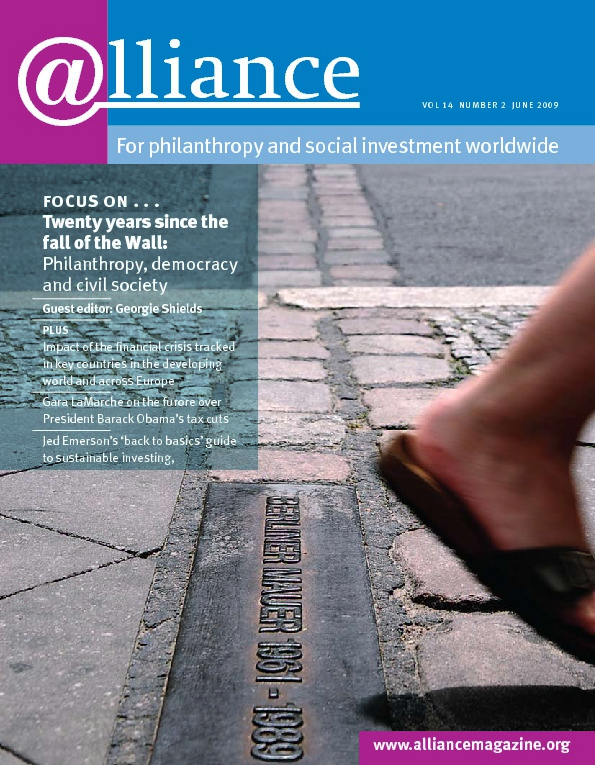A new administration in Washington seems determined to narrow the gap between rich and poor, which has widened in recent years, and to begin to strengthen the fraying social safety net by pressing for national health care – a goal that has eluded presidents since Harry Truman. It is a heady time, but the changes have exposed some uncomfortable truths about parts of the US non-profit sector.
If governments are to provide health and economic security for all citizens, they have to be able to pay for it. In the president’s budget, some of this would come from savings in other areas. Whether this comes from ending wasteful Pentagon spending, curbing unnecessary agricultural subsidies, or ending monopolies for firms that offer student loans, there has been a predictable outcry from the special interests involved. But it is not possible to expand health care without raising revenue, and here I have concerns about how the leading voices of American philanthropy have been raised – or, for that matter, silent.
The President sought to pay for his healthcare plan in part by capping at 28 per cent the charitable deduction that can be claimed for families earning over $250,000 or individuals earning over $200,000, bringing it down from the current rates of 33 and 35 per cent (which is where it was under Ronald Reagan, who was not a big fan of taxes). Of the two leading non-profit sector membership organizations, the Council on Foundations opposed the change, while Independent Sector was more measured, asserting that it would reduce charitable giving while acknowledging that charities sagging under the weight of healthcare costs would benefit.
The evidence about impact on charitable giving is mixed. The Center on Philanthropy at Indiana University asserts that the tax changes by themselves would have little direct negative impact. ‘If it’s really a charitable contribution,’ said President Obama, ‘I’m assuming that [the tax deduction] shouldn’t be the determining factor.’ He added: ‘I think it is a realistic way for us to raise some revenue from people who’ve benefited enormously over the last several years … It’s not going to cripple them.’
I agree. What the President didn’t say is that the precise level of the charitable deduction (like the fact of the deduction itself) did not come down on tablets from Mount Sinai. It is a choice that a democratic society makes, weighing competing interests and values. One of these is donor independence and philanthropic pluralism. Another is the responsibility of citizens in a democracy, acting together through government, to strengthen social protections – in this case, health care, which the President said during the election debates is a ‘right’, not a privilege.
To argue against a critical funding mechanism for something as fundamental as health care seems to me to amount to asserting that democratically determined public needs, particularly for the most marginalized, should be trumped by an interest in having wealthy people keep more control of how they direct their funds. There were certainly other interests arrayed against the President’s proposed changes for those who itemize tax deductions – like the mortgage lending industry – but their job was made considerably easier by the outcry from the philanthropic and non-profit sector, and now it appears that part of the administration’s revenue plan is in grave jeopardy. So much the worse for health care.
I am in strong sympathy with organizations that are having to deal with the financial crisis. The Atlantic Philanthropies is holding the line on its grants and providing millions of dollars in emergency support for those most in jeopardy, while also directing significant sums to advocacy efforts in support of healthcare reform and equitable recovery. But I think it is shortsighted, and heedless of the societal imperative to provide a much stronger safety net in the US, to take a status quo position on the tax system at this critical time.
During the Bush years, when there was a concerted and successful effort to redistribute wealth upwards through massive tax cuts for the rich, coupled with an illicit war with staggering costs in blood and money, it was hard to find a voice in American philanthropy raised in protest. And yet there is no question that those most in need of philanthropy – the poor, the sick, minorities, women, the old – bore the brunt of those costs.
In the wake of a pivotal election, these misguided priorities are being reversed. At such a moment, philanthropy should be careful not to act like just another interest group out to protect its piece of the pie.
Gara LaMarche is President of The Atlantic Philanthropies. Email g.lamarche@atlanticphilanthropies.org
Update
President Obama plans to stick to his proposal to cap the federal tax breaks wealthy people can get for itemized deductions, including charitable donations, when he submits the final piece of his budget plans, said White House budget director Peter Orszag on 9 May.






Comments (0)